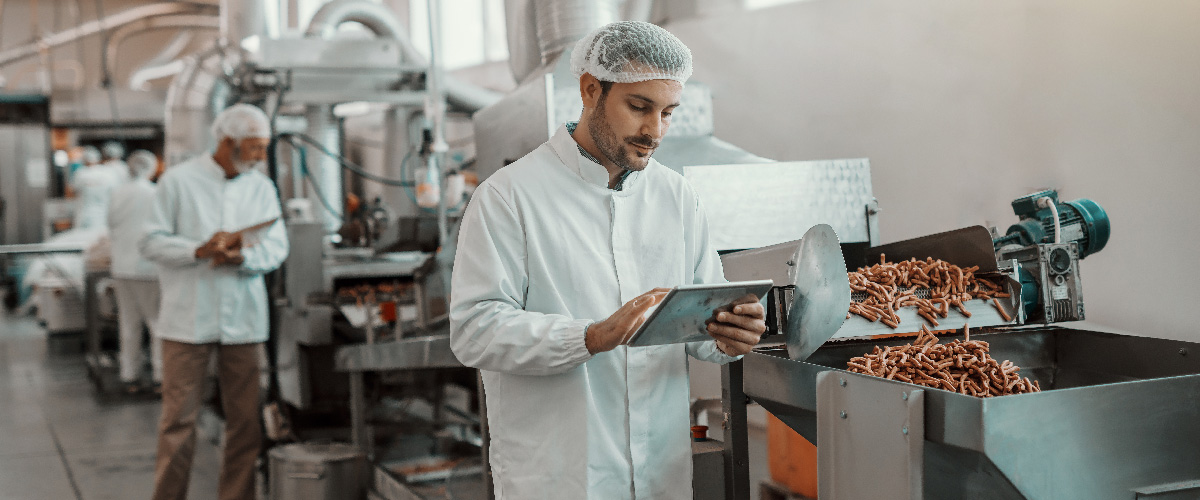 Web Content Viewer
Web Content Viewer
Solutions to Achieving Sustainable Operations in The Food And Beverage Industry

The complexity and magnitude of environmental concerns in food systems present significant challenges to building sustainable operations. Global food supply chains, for example, account for one-third of human-produced greenhouse gas (GHG) emissions each year. During a product’s lifecycle, processes related to fuel and energy consumption, food production, and transportation continuously emit gasses into the atmosphere. Cargo transportation alone is responsible for 8% of global GHG emissions.
Along with supply chain activities, food waste negatively impacts the environment. A third of food in the U.S. goes uneaten, and food waste comprises 24% of landfills. Since most of the food supply chain still relies on legacy processes and technology, it increases the risk of under- and overproduction because it’s more difficult to manage stock levels. Smarter tools and infrastructure can create an agile, connected supply chain to curb food waste.
Given the stakes, food brands have clear incentives to invest in technologies that make sustainable processes possible. Data-driven solutions with embedded AI capabilities can help inform decision-making to increase efficiency and reduce waste.
Three Sustainability Technologies
Technologies like enterprise resource planning (ERP) software, transportation management systems (TMS), and warehouse management systems (WMS) can enable sustainable practices.
For example, ERP coupled with analytics allows food and beverage operations to access data-driven insights about resource use and waste production. Various smart solutions can empower brands with the information they need to prioritize sustainability while increasing efficiency.
More specifically, here’s how three data-driven technologies can increase sustainable practices across the food supply chain.
Sensor Technologies
Sensor technologies such as IoT- enabled devices capture granular data throughout supply chain operations, including inventory levels and environmental conditions. This enables organizations to gain end-to-end supply chain visibility from farms to consumers, helping them identify specific environmental challenges in their operations.
In addition to increased visibility, sensor technologies can help organizations prevent food spoilage. Through the integration of IoT-enabled devices in the supply chain, organizations can automate temperature monitoring and reporting during distribution, transit and storage—improving both efficiency and food safety.
Blockchain
ERP, TMS and WMS systems can transfer real-time information via blockchain to improve product traceability. Increased transparency across all stages of the supply chain helps food brands mitigate the risk of expensive recalls, minimize food waste, and optimize efficiencies.
For example, food organizations can incur high legal and financial penalties, tarnished brand reputations and loss of customer trust because of a mishandled product recall. However, with access to data from each stage of a product’s lifecycle, businesses can more quickly and precisely identify safety issues in the food supply. By doing so, organizations can reduce waste by removing only the impacted products from the inventory.
Predictive Analytics
Predictive analytics, powered by statistical algorithms, machine learning, AI, and internal and external data sources, can help organizations identify demand patterns and forecast future trends. Even more, food brands can leverage data-driven insights to optimize water and energy consumption and manage climate risks such as fluctuating weather patterns and natural disasters.
Predictive analytics can also help businesses avoid overproduction. For example, certain food products are in high demand at specific times of the year, so organizations can plan accordingly. When products are in low demand, organizations can shrink or adapt operations to optimize stock levels and reduce waste.
Along with improving demand forecasting, predictive analytics can optimize trucking and cargo shipping routes to increase fuel efficiency. Unexpected events such as traffic congestion and severe weather can delay deliveries, increasing fuel consumption in the process. Route optimization and backhaul software paired with AI technology allow for immediate rerouting and simultaneously collect data to inform future decision-making. As a result, food brands can reduce fuel usage, prevent perishable items from spoilage, and deliver products on time.
It’s a mistake to sideline sustainability, even in a challenging economy. Data-driven technologies with AI capabilities can help food and beverage businesses quickly transition to sustainability-focused decision-making and practices—and allow them to reap the benefits of long-term efficiency and profitability.
Kevin Beasley
Chief Information Officer
Chief Information Officer
Comments
By using this site you agree to our Privacy Policy and our Terms of Use.
120 Comac Street
Ronkonkoma, NY 11779
Ronkonkoma, NY 11779
 | Vormittag Associates, Inc. ©2025 |
| Vormittag Associates, Inc. ©2025 |